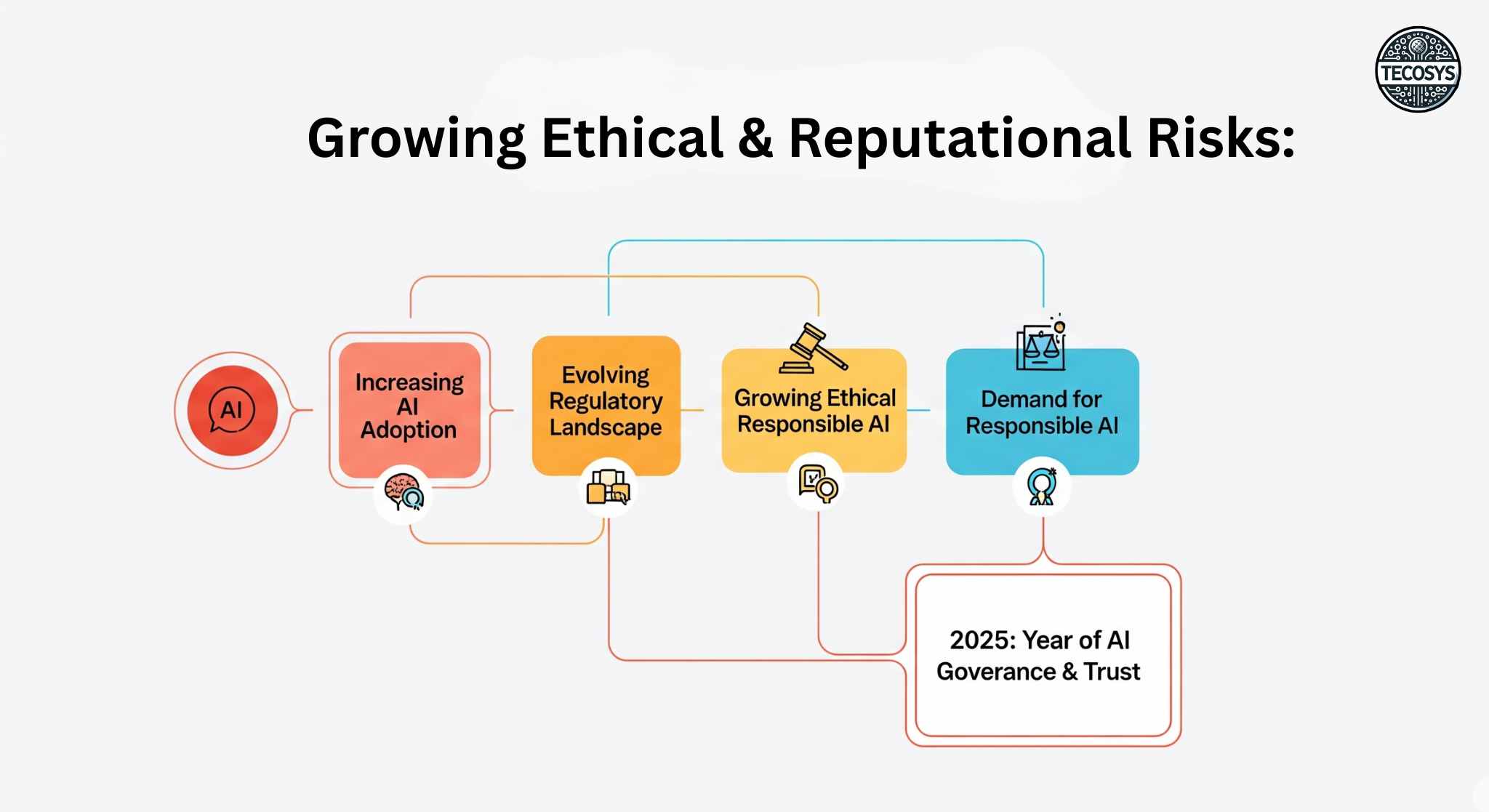1. Enterprise AI is becoming increasingly risky
The deployment of AI in businesses took three reasons at a faster pace:
- Ripeness of AI Agents- Artificial intelligence-driven helpers are now being able to handle work related to scheduling, answering consumer questions, risk detection and forecasting.
- Enterprise LLM innovations — Enterprise-tuned Large Language Models have enabled the power of natural language querying, sophisticated reporting and contextual decision-making.
- Integrated Enterprise AI Solutions — Companies are moving to integrated systems that unite automation, predictive analytics and generative AI on a single stack.
But there is also an increasing stake involved with these:
- Risks of bias and fairness — Successfully controlled AI has a chance to reinforce discrimination.
- Regulatory exposure- New AI regulations require explain ability and data privacy, auditability.
- Operational dependency- processes of paramount importance depend on AI, failure to govern these will have business-shattering consequences.
That is 2025 when enterprises will no longer be able to ignore risk related to AI as a future problem it is a boardroom priority now.
2. Regulatory Wave Crashing in 2025
Regulations of AI around the world have already been on the way of being developed by governments over the years but in 2025, these regulations will take effect truly.
- EU AI Act -Enforcement deadlines anticipated in 2025. Enterprises will be required to categorize that AI systems under risk level and be subject to rigorous transparency and test criterion.
- US AI Governance Frameworks Centers of responsibility tend towards issuing guidelines on responsible AI by the federal agencies, especially concerning such industries as financing, healthcare, and defense.
- Asia-Pacific AI Policies It has been observed that the Asia-Pacific counties such as Singapore, Japan and India are implementing sector-specific AI compliance regulations with a stake placed on ethics and consumer protection
Why is this important: Regulation of AI is not a voluntary, piecemeal initiative anymore, it is becoming compulsory and international. Enterprises need to be ready to conform across borders but that necessitates single AI governance platforms that scale policy enforcement, risk surveillance, and documentation.

AI governance: Where AI meets compliance, security, and trust.
3. What will AI Governance Platforms Do in 2025 ?
An AI governance platform is the backbone to operations whereby it enables an enterprise to track and control its AI systems and aids in auditing. Their importance will increase in 2025 due to the fact:
- Regulatory compliance automation: Automatically monitors the usage of models, sources of data etc. and the compliance reports.
- Bias and risk detection: Constantly detects bias and risks in the production of AI Agents and Enterprise LLMs.
- Day to day compliance: Cross-functional governance- Aligns compliance, data science, legal, and operations in a single system.
- Version and change management: Make sure that any update on an AI model does not bring in new risks.
Without these solutions, business stand a real danger of operating an opaque, untraceable and non-compliant AI ecosystem a legal and reputational nightmare in the making.
4. AI Agents and the Problem of Responsibility
In 2025, AI agents will be autonomous, and will:
- Manage multi step operations without human intervention.
- Propose revenue, security or compliance related recommendations.
- Get to interact face to face with customers in real time.
The issue of accountability is obvious:
When an AI Agent does something wrong, who is liable?
This is where AI Governance safeguards:
- There are well-defined boundaries of operations on the side of agents.
- Their reasoning behind the decision can be made sense of.
- Audit logs enable them to trace their activities.
Businesses have to treat AI Agents simply as digital workers, complete with an organizational governance framework, similar to human worker human resources policies.
5. Enterprise LLM: Authority and Accountability
Enterprise LLM technology has revolutionized the way a business is run. Trained with proprietary data, these large language models make possible:
- Inquiry on conversation data.
- Summarization at scale.
- Interpretation of policy and text in the law.
However, they also come along with risks:
- Hallucinations — Faking information which sounds right.
- Data leakage — Pending on accidentally revealing some sensitive information in outputs.
- Regulatory breaches -Preparing advice or non-compliant material.
When we speak of governance here we mean:
- Model output validation.
- Tight control of access.
- Re-training to be in line with new regulations regularly.
By 2025, businesses that have not adopted governance frameworks on Enterprise LLM may suffer reputational damage as far as regulators and customers are concerned.

Governance first, trust always.
6. The development of Governance-First Enterprise AI Strategy
Innovative companies that will succeed in 2025 will not view AI Governance as a tick box, but as a basis. This is a guide:
- Evaluate the AI Landscape nowadays- Find all AI Agents, models and workflows that are used.
- Implement AI Governance Platforms- Standardize reporting, observation, and supervision.
- Comply with AI Regulations- Align enterprise AI application against local and international regulations.
- Form Cross-Functional Artificial Intelligence Councils, Someone needs to represent IT, compliance, data science, legal, and operations.
7. Competitive advantage of responsible AI
It is not only crucial to evade penalties by doing AI governance correctly but rather about creating trust. In 2025:
- Transparency into the usage of AI when used by brands will help acquire customers.
- Enterprises with a good level of AI risk management will be a preference to investors.
- Skilled personnel will want to work with businesses using AI in an ethical way.
The ethics of AI is becoming a point of distinction. Businesses integrating governance with their Enterprise AI Solutions will be able to position themselves as innovative trustworthy companies.
8. Looking beyond 2025:
Why AI governance is now an ongoing need AI governance will not stop evolving and even though 2025 might make the inflection point the effects will still be felt for years:
- There will be increased global standardization of AI laws.
- Ai Agents will be more advanced and this will need more control.
- Financial, legal and healthcare systems will be the foundation of Enterprise AI with complexity of governance.
The message strongly gets home: Governance is not a one- time initiative. It is an everlasting pillar of AI strategy in enterprise.
The year 2025 will not simply be another stage in the progress of AI, but the year when AI governance becomes a new key determinant of successful enterprise activity or failure. As the regulations of AI came into effect, AI governance platforms are mainstream, and the rising capability of AI Agents and Enterprise LLM enterprises need to now act, or they risk becoming in compliance, uncompetitive, and untrustworthy.
In 2025, the victors shall be those that define governance as a growth facilitator, and not as a limiter. The hesitaters will be fined, their reputation tarnished, and are set to lose in the struggle to stay ahead of the pack.
9. Frequently Asked Questions :
Q1. What is governance in AI?
The terms AI governance refer to the policies, structures, and platforms through which the operation of AI systems is ethical, transparent and compliant with the regulations.
Q2. Is AI governance relevant in 2025?
Due to the responsibility of various global AI regulations that will be enforced in 2025, governance will be necessary in terms of compliance and trust.
Q3. What is the AI governing platform?
They also unify oversight and audit and compliance reporting across all enterprise AI systems and both AI Agents and Enterprise LLM.
Q4. How are AI Agents involved in governing?
AI Agents tend to act independently, hence governance makes them have boundaries, transparency, and accountability.
Q5. Where to begin with AI governance in the enterprise?
Start by charting all the AI systems at work, implement governance platforms, comply with regulations, and establish cross-functional oversight teams.
2025 is here, and it is time to act now.
Do not wait until compliance deadlines force you to live in a harsher state of AI strategy. Become one of the VIPs Partners with Tecosys to launch Enterprise AI Solutions, integrate powerful AI Governance Platforms and make sure that your AI Agents and Enterprise LLM benefit consumers within the most ethical and legal framework.
Like to get your AI future to be compliant, transparent, and unstoppable?
Touch us up to date to book your AI governance readiness consultation.”